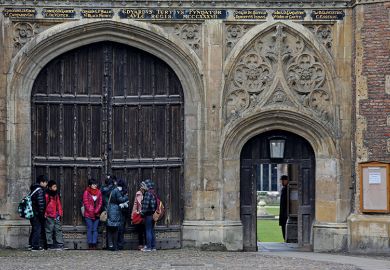The University of Oxford will launch two programmes for state school students from under-represented groups, one offering 50 places on the basis of lower “contextual” A-level grades, in a new drive to recruit 25 per cent of students from socio-economically disadvantaged backgrounds by 2023.
Oxford said the two programmes, free to students and to be phased in from the next admissions round, would provide places for up to 250 state school students a year once fully up and running, representing 10 per cent of Oxford’s UK undergraduate intake.
Samina Khan, director of undergraduate admissions and outreach at Oxford, said the university had been making “solid, incremental progress in terms of diversifying Oxford’s undergraduate body” in recent years. Now the university wants to “increase the pace of change”, she told Times Higher Education.
Dr Khan also said the move away from the modular system in A levels “means that there are no longer AS [grades] available for us to see when students apply, and we just want to make sure…we still have access to talented students, particularly from backgrounds where they don’t traditionally apply to us.”
Dr Khan said that after the introduction of the programmes, which would be “open only really for state school students…we hope to see an increase from state schools in terms of Oxford’s proportion of state to private school [students]”.
She added: “We hope by 2023 to move to one in four students…coming from a socio-economically disadvantaged background.”
An Oxford spokeswoman said student disadvantage would be judged on neighbourhood-level data, eligibility for free school meals, ethnic background, status as young carers or people in care, and progression from schools judged to be low-achieving on exam results.
At present, 15 per cent of Oxford undergraduates come from disadvantaged socio-economic backgrounds, as measured on those criteria.
The first new programme, Opportunity Oxford, will be a pre-first year study programme for up to 200 students from such disadvantaged backgrounds who applied to the university “in the normal way and are on course to gain the required grades, but need additional support to transition successfully from school to Oxford”, with aims including enhancing confidence, the university said in a statement.
The university will also launch Foundation Oxford, a one-year programme offering 50 places by 2023.
This scheme will be for “students who have experienced personal disadvantage or severely disrupted education”, with “high academic potential who, owing to their circumstances, are not yet in a position to make a competitive Oxford application”, according to Oxford’s statement.
The university gave the example of students who may be refugees, have care responsibilities or be in care themselves.
The programme will offer places “on the basis of lower contextual A-level grades, rather than the university’s standard offers”, Oxford said.
Once the one-year preparation programme is completed, students will enter their undergraduate degree course.
Asked about recent criticism of “social engineering” in favour of state school admissions at Oxford and the University of Cambridge from one private school head, Dr Khan said: “I think it’s important to remember that we’re still recruiting on academic merit…We will be maintaining standards.” The schemes would “support the students who apply to us from disadvantaged backgrounds, because they are not getting support from school or home, quite often”, Dr Khan.
“It’s fair to say Oxford is competitive already; it may well become even more competitive in the future,” she added.
Asked whether the total of 50 contextual places on offer was small, Dr Khan replied: “When you put it in the context of everything that we’re doing, it’s not small.” She highlighted the recent expansion of Oxford’s summer school for disadvantaged students.
Overall on the two schemes, she said: “Standards will be maintained. It’s our way of saying Oxford is open and we want more diverse students to apply to us.”
Louise Richardson, Oxford’s vice-chancellor, said: “This is a sea change in Oxford admissions. Colleagues from across the university, its colleges and departments have united behind a commitment to accelerate the pace at which we are diversifying our student body and ensuring that every academically exceptional student in the country knows that they have a fair chance of a place at Oxford.”
Luke Heselwood, a senior researcher at the Reform thinktank, said that, while the new foundation places were “welcome”, it was “a drop in the ocean when 40 per cent of Oxford students are from a private school, compared to 7 per cent in the country”.
“Disadvantaged students who get high enough grades to attend a top university are less likely to apply to one. Oxford’s efforts may be better spent targeting them,” Dr Heselwood said.
Register to continue
Why register?
- Registration is free and only takes a moment
- Once registered, you can read 3 articles a month
- Sign up for our newsletter
Subscribe
Or subscribe for unlimited access to:
- Unlimited access to news, views, insights & reviews
- Digital editions
- Digital access to THE’s university and college rankings analysis
Already registered or a current subscriber?








